The Home Happiness Index
Change the first page text to the following:
This quiz measures our homes according to values people state are most important: “Happiness”, “Relationships”, “Health” and “Purpose”. It's a measure of our homes, which includes walkable vicinity ("neighborhood"). It does not measure the many important aspects of our lives that are outside of our homes and neighborhoods.
[Start Quiz]
This quiz measures our homes according to values people state are most important: “Happiness”, “Relationships”, “Health” and “Purpose”. It's a measure of our homes, which includes walkable vicinity ("neighborhood"). It does not measure the many important aspects of our lives that are outside of our homes and neighborhoods.
[Start Quiz]

[note: I added a new Question #1. If the person selects "A", then the entire quiz is short-circuited and you skip to the end with a version where there are no subscores and your Overall Home Happiness Score= +65..]
1. Select all that apply: {sort_order=0}
Recent studies show that:
Living with likable neighbors and friends nearby helps make connecting with others "reactive" rather than "proactive". You have friends and connections in your day-to-day life outside your door.
But if you chose "A" as your answer, perhaps you wouldn't benefit from connections with others nearby. You might be around people all day and just want to be alone at home and in your neighborhood. You don't get lonely at home and can maintain excellent relationships by driving to them, or over the phone or Facebook.
http://www.emersoncommons.org/uploads/2/9/2/6/29265225/isolated-house.jpg?380
1. Select all that apply: {sort_order=0}
- I like to live in "splendid isolation". I have no need for a walkable neighborhood where I might have social connections immediately around me. [Overall Home Happiness Score= +65. Skip to end of quiz. Don't display the table with the subscores]
- I could benefit from living somewhere that I like my neighbors and maybe even have friends nearby. [Happiness Score= +0]
Recent studies show that:
- Loneliness is a greater predictor of early death than obesity.
- Loneliness causes people to undergo negative changes at a cellular level.
- Conversely, living in a community with a sense of purpose increases longevity.
Living with likable neighbors and friends nearby helps make connecting with others "reactive" rather than "proactive". You have friends and connections in your day-to-day life outside your door.
But if you chose "A" as your answer, perhaps you wouldn't benefit from connections with others nearby. You might be around people all day and just want to be alone at home and in your neighborhood. You don't get lonely at home and can maintain excellent relationships by driving to them, or over the phone or Facebook.
http://www.emersoncommons.org/uploads/2/9/2/6/29265225/isolated-house.jpg?380

[note: I changed Question #1. Change it to be checkboxes where any combination of the below can be selected.]
1. Select all that apply: {sort_order=5}
http://www.emersoncommons.org/uploads/2/9/2/6/29265225/15885428140-3e9cf34059-b.jpg
1. Select all that apply: {sort_order=5}
- There are rooms in my house that are too big or that I never use. [Happiness Score= +0]
- I would be happier with more rooms or space in my house [Happiness Score= +0]
- I'm happy with the size of my home. [Happiness Score= +2]
http://www.emersoncommons.org/uploads/2/9/2/6/29265225/15885428140-3e9cf34059-b.jpg

2. Do you have quick access to nature or a park? {sort_order=6}
a recent evaluation of the UK’s first month-long nature challenge, which took place in 2015 and involved people "doing something wild" every day for 30 consecutive days, shows scientifically and statistically how significant it really is.
The study showed that there was a scientifically significant increase in people’s health, happiness, connection to nature and active nature behaviours, such as feeding the birds and planting flowers for bees – not just throughout the challenge, but sustained for months after the challenge had been completed.
http://www.emersoncommons.org/uploads/2/9/2/6/29265225/park.jpg
- One minute walk [Happiness Score= +4]
- Less than 5 minute walk [Happiness Score= +2]
- More than 5 minute walk away [Happiness Score= +0]
- Having a walkable park or nature is not a priority for me [Happiness Score= +0]
a recent evaluation of the UK’s first month-long nature challenge, which took place in 2015 and involved people "doing something wild" every day for 30 consecutive days, shows scientifically and statistically how significant it really is.
The study showed that there was a scientifically significant increase in people’s health, happiness, connection to nature and active nature behaviours, such as feeding the birds and planting flowers for bees – not just throughout the challenge, but sustained for months after the challenge had been completed.
http://www.emersoncommons.org/uploads/2/9/2/6/29265225/park.jpg
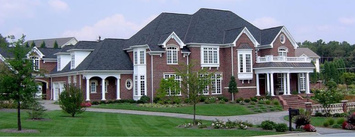
3. Is the cost to own and maintain your home: {sort_order=8}
Why is this question here?:
A home can be a money pit for utilities, taxes and maintenance. Larger and older homes obviously cost more to maintain. But some people love to continue to enhance their home and tinker with home renovations. Therefore, this question merely measures your happiness with how much you spend on your home.
http://www.emersoncommons.org/uploads/2/9/2/6/29265225/mcmansion2.jpg?360
- too much hassle or cost [Happiness Score= +0]
- not a problem. [Happiness Score= +2]
Why is this question here?:
A home can be a money pit for utilities, taxes and maintenance. Larger and older homes obviously cost more to maintain. But some people love to continue to enhance their home and tinker with home renovations. Therefore, this question merely measures your happiness with how much you spend on your home.
http://www.emersoncommons.org/uploads/2/9/2/6/29265225/mcmansion2.jpg?360

4. Select all that apply: {sort_order=3}
http://www.emersoncommons.org/uploads/2/9/2/6/29265225/happily-backpacking.jpeg?336
- My Internet is fast enough (or I don't care about it) [Happiness Score= +1]
- My kitchen meets my needs for cooking (or I don't cook) [Happiness Score= +1]
- I have adequate heating and cooling (or I don't mind if it's too hot or cold sometimes) [Happiness Score= +1]
http://www.emersoncommons.org/uploads/2/9/2/6/29265225/happily-backpacking.jpeg?336
I deleted #5 (Do you live alone?). I also deleted #6 (Not counting your home, how many relatives...)
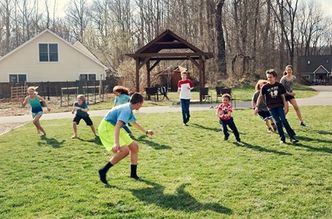
7. Answer this question if you are a kid or have kids: How many friends can you/your child run outside and see without setting up a play date. {sort_order=7}
Why is this here? Spontaneous play is important for kids' well-being and development. The ability to just run outside and play with other kids has become less common in the century of the automobile. Spontaneity is also important for adults.
"Free-range Parenting" is a recent term for a style of parenting that was long the norm but is now on the wane. In his 1946 bestseller, Dr. Benjamin Spock advocated allowing children levels of independence in accordance of their age of development. Parents still know that kids are happier and develop better when they are given freedom to explore and learn from their own mistakes. But sometime after the 1980s, fearfulness and helicopter parenting became normal in the US. We know that letting kids have the run of the neighborhood is good for them, but there's still this parental fear. Why is this?
http://www.emersoncommons.org/uploads/2/9/2/6/29265225/sharks-and-minnows-2013.jpg?333
- None [Relationship Score=+0]
- 1 [Relationship Score=+1]
- 2 [Relationship Score=+2]
- 3-5 [Relationship Score=+4]
- Over 5 [Relationship Score=+6]
Why is this here? Spontaneous play is important for kids' well-being and development. The ability to just run outside and play with other kids has become less common in the century of the automobile. Spontaneity is also important for adults.
"Free-range Parenting" is a recent term for a style of parenting that was long the norm but is now on the wane. In his 1946 bestseller, Dr. Benjamin Spock advocated allowing children levels of independence in accordance of their age of development. Parents still know that kids are happier and develop better when they are given freedom to explore and learn from their own mistakes. But sometime after the 1980s, fearfulness and helicopter parenting became normal in the US. We know that letting kids have the run of the neighborhood is good for them, but there's still this parental fear. Why is this?
http://www.emersoncommons.org/uploads/2/9/2/6/29265225/sharks-and-minnows-2013.jpg?333
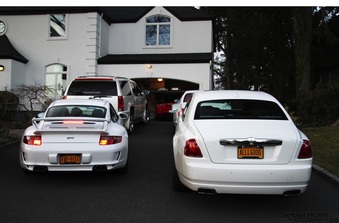
[#8 (More than saying hello) has change to the following)
8. How spontaneous is your social life? {sort_order=2}
Why is this here? More often than not, after our college days, we become decidedly less social because of all the work to keep up a social life. This is not just because we are busier, but also because of our physical separation. Generally, we can’t just walk outside and be amongst friends like in college. Our car-centric lifestyle has forced our social lives to be more proactive. There’s planning involved before inviting people over. We have to get on peoples' schedules.
More spontaneous socializing happens when people live closer together with pleasant outdoor spaces to congregate.
Imagine a summer early evening in a small rural fishing village. It can be anywhere in the world - be it Southern Europe, Latin America, Asia or Africa. With the aroma of grilled fish in the air, the men and women of the village socialize outside after their hard day while children run around. This happens in the United States, too, when the car is out of the picture and there are nice outdoor spaces to congregate. It's often when not everyone can afford a car. You see neighbors enjoying each others' company outdoors.
http://www.emersoncommons.org/uploads/2/9/2/6/29265225/cars.jpeg?339
8. How spontaneous is your social life? {sort_order=2}
- I have to drive when getting together with friends [Relationship Score=+0]
- I sometimes get together with friends by walking out my door. [Relationship Score=+1]
- I frequently see fun gatherings happening outside my door and I join in. [Relationship Score=+2]
Why is this here? More often than not, after our college days, we become decidedly less social because of all the work to keep up a social life. This is not just because we are busier, but also because of our physical separation. Generally, we can’t just walk outside and be amongst friends like in college. Our car-centric lifestyle has forced our social lives to be more proactive. There’s planning involved before inviting people over. We have to get on peoples' schedules.
More spontaneous socializing happens when people live closer together with pleasant outdoor spaces to congregate.
Imagine a summer early evening in a small rural fishing village. It can be anywhere in the world - be it Southern Europe, Latin America, Asia or Africa. With the aroma of grilled fish in the air, the men and women of the village socialize outside after their hard day while children run around. This happens in the United States, too, when the car is out of the picture and there are nice outdoor spaces to congregate. It's often when not everyone can afford a car. You see neighbors enjoying each others' company outdoors.
http://www.emersoncommons.org/uploads/2/9/2/6/29265225/cars.jpeg?339
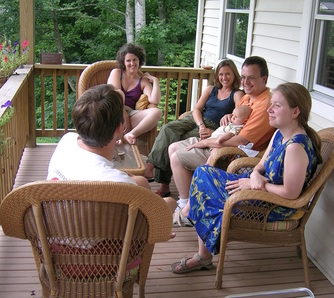
9. Neighbors who are friends. In a typical week, how many times do you interact with a neighbor? Interaction is defined as spending more than 15 minutes together at a home or nearby walkable place. {sort_order=12}
http://www.emersoncommons.org/uploads/2/9/2/6/29265225/g4cropped_1.jpg?336
- None
- 1-2 [Relationship=+1]
- 3-4 [Relationship=+2]
- 5+ [Relationship=+4]
http://www.emersoncommons.org/uploads/2/9/2/6/29265225/g4cropped_1.jpg?336

10. Can you borrow a cup of sugar from a next door neighbor without it seeming strange? {sort_order=9}
http://www.emersoncommons.org/uploads/2/9/2/6/29265225/valentine-cookies.jpg?334
- No [Relationship=+0]
- Yes [Relationship=+2]
- Yes, and I'll give them some cookies when I'm done! [Relationship=+3]
http://www.emersoncommons.org/uploads/2/9/2/6/29265225/valentine-cookies.jpg?334
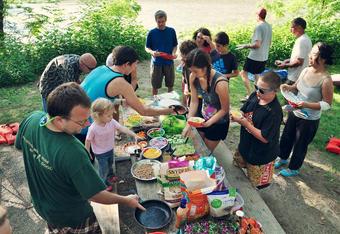
11. How often have you had a block party or community event in your neighborhood? {sort_order=13}
http://www.emersoncommons.org/uploads/2/9/2/6/29265225/slv-camping.jpg?341
- Never [Relationship=+0]
- Once or twice a year [Relationship=+1]
- 3 to 4 times a year [Relationship=+2]
- Once a month [Relationship=+4]
- At least once a week [Relationship=+6]
http://www.emersoncommons.org/uploads/2/9/2/6/29265225/slv-camping.jpg?341

12. Are you lonely in your home? {sort_order=1}
Similar to the feeling of hunger, researchers speculate that the loneliness feeling serves an evolutionary need: We feel hungry so that we eat and don’t die. Likewise, we physically feel lonely so that we make connections with each other and we can collectively thrive.
A recent UCLA study now suggests a cellular connection to this physical feeling:
Researchers from the UCLA School of Medicine, University of California at Davis and University of Chicago recently found complex immune system reactions at work in lonely people. Their study determined lessened activity in genes that produce antibodies to fight infection. It also found increased activity in genes responsible for inflammation.
Sadly, the modern world has too often isolated many of us into homes living physically apart from others. No matter how hard we try to socialize, we are home alone most of the time and get lonely. This is especially a problem for retired people who can’t just walk outside and connect with other people.
http://www.emersoncommons.org/uploads/2/9/2/6/29265225/mcmansions_11.jpg?354
- Rarely [Health=+3]
- Some days of the week [Health=+0]
- Most days of the week [Health=+0]
Similar to the feeling of hunger, researchers speculate that the loneliness feeling serves an evolutionary need: We feel hungry so that we eat and don’t die. Likewise, we physically feel lonely so that we make connections with each other and we can collectively thrive.
A recent UCLA study now suggests a cellular connection to this physical feeling:
Researchers from the UCLA School of Medicine, University of California at Davis and University of Chicago recently found complex immune system reactions at work in lonely people. Their study determined lessened activity in genes that produce antibodies to fight infection. It also found increased activity in genes responsible for inflammation.
Sadly, the modern world has too often isolated many of us into homes living physically apart from others. No matter how hard we try to socialize, we are home alone most of the time and get lonely. This is especially a problem for retired people who can’t just walk outside and connect with other people.
http://www.emersoncommons.org/uploads/2/9/2/6/29265225/mcmansions_11.jpg?354

13. Select all that apply {sort_order=4}
http://www.emersoncommons.org/uploads/2/9/2/6/29265225/smokers.jpg?299
- Someone in my home smokes [Health=-2]
- I am exposed to air pollution. This might be excessive smoke from a neighbor's chimney [Health=-1]
- I am exposed to noise pollution [Health=-1]
- I am exposed to light pollution that bothers me [Health=-1]
http://www.emersoncommons.org/uploads/2/9/2/6/29265225/smokers.jpg?299

[change this to checkboxes rather than radio buttons]
14. Select all that apply {sort_order=11}
http://www.emersoncommons.org/uploads/2/9/2/6/29265225/window-bars.jpg
14. Select all that apply {sort_order=11}
- I feel safe in my neighborhood [Health=+1]
- I feel safe in my home [Health=+1]
http://www.emersoncommons.org/uploads/2/9/2/6/29265225/window-bars.jpg

15. How many neighbors within a 5 minute walk would you trust the keys to your house and feel comfortable calling on in and emergency. {sort_order=10}
http://www.emersoncommons.org/uploads/2/9/2/6/29265225/keys.jpeg
- None [Health=+0]
- 1-2 [Health=+1]
- 3-4 [Health=+2]
- 5+ [Health=+4]
http://www.emersoncommons.org/uploads/2/9/2/6/29265225/keys.jpeg
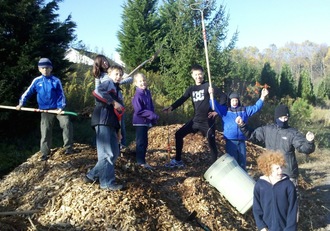
16. Working together on a common purpose with your family and neighbors: In the past two months, how many projects around your home have you worked on together with others nearby? A project might be helping a child on a school project. But outside the home, it also includes working with neighbors to organize social activities, cooking together and working to maintain or beautify your neighborhood. {sort_order=14}
http://www.emersoncommons.org/uploads/2/9/2/6/29265225/mulchkins.jpeg?331
- None
- 1-2 [Purpose=+1]
- 3-4 [Purpose=+2]
- 5+ [Purpose=+4]
http://www.emersoncommons.org/uploads/2/9/2/6/29265225/mulchkins.jpeg?331
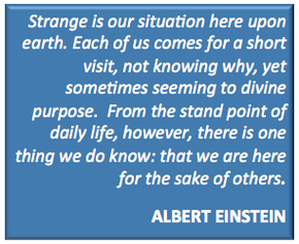
17. In the past two months, how many people have you cared for that are within 5 minutes walking distance? Caring includes cooking for, helping out, babysitting, etc. {sort_order=15}
Why is this question here? We live a purposeful life by helping others. As Einstein stated above, we are here primarily for the sake of others. Our main life purpose might be volunteering or mission-oriented career. But we gain a bonus extra meaning in our lives when we also contribute to the lives of the people immediately around us.
http://www.emersoncommons.org/uploads/2/9/2/6/29265225/einsteinquote.png?300
- None
- 1-2 [Purpose=+1]
- 3-4 [Purpose=+2]
- 5+ [Purpose=+4]
Why is this question here? We live a purposeful life by helping others. As Einstein stated above, we are here primarily for the sake of others. Our main life purpose might be volunteering or mission-oriented career. But we gain a bonus extra meaning in our lives when we also contribute to the lives of the people immediately around us.
http://www.emersoncommons.org/uploads/2/9/2/6/29265225/einsteinquote.png?300
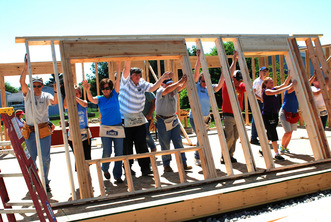
18. Are you engaged with local organizations that encourage civic engagement or provide social services such as literacy, meals on wheels, voter registration, support for schools, or support for affordable housing. {sort_order=16}
http://www.emersoncommons.org/uploads/2/9/2/6/29265225/habitat-for-humanity.jpg?333
- Yes [Purpose=+1]
- No [Purpose=+0]
http://www.emersoncommons.org/uploads/2/9/2/6/29265225/habitat-for-humanity.jpg?333
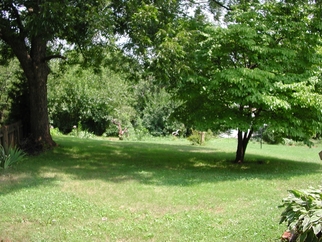
18. Can your home satisfy your need for privacy whenever you need it {sort_order=165}
http://www.emersoncommons.org/uploads/2/9/2/6/29265225/backyard.jpg?324
- Yes [Purpose=+4]
- No [Purpose=+0]
http://www.emersoncommons.org/uploads/2/9/2/6/29265225/backyard.jpg?324
Change the last page text as follows
Change the Connectedness paragraph to the following:
"This is how your home helps you in your relationships to others. Having relationships nearby promotes day-to-day happiness."
Change the Purpose paragraph to the following:
There is evidence that people with a purpose live longer and happier lives. Our main life purpose doesn't have to involve our neighbors. But if we also have some purpose, meaning and connection with those we share our immediate surroundings, then our lives are all the richer. This score measures that.
------------------------------
Ignore the below. I will make use of this.
Change the Connectedness paragraph to the following:
"This is how your home helps you in your relationships to others. Having relationships nearby promotes day-to-day happiness."
Change the Purpose paragraph to the following:
There is evidence that people with a purpose live longer and happier lives. Our main life purpose doesn't have to involve our neighbors. But if we also have some purpose, meaning and connection with those we share our immediate surroundings, then our lives are all the richer. This score measures that.
------------------------------
Ignore the below. I will make use of this.
References
Nature and Happiness
http://www.bbc.com/earth/story/20160420-how-nature-is-good-for-our-health-and-happiness
https://www.psychologytoday.com/blog/the-moment-youth/201403/does-nature-make-us-happy
Photos
All photos are used with permission directly from the photographer or according to the licensing terms
Isolated House: http://list25.com/25-unreal-isolated-houses-that-are-breathtakingly-beautiful/,
image of McMansion: https://www.flickr.com/photos/pasa/15885428140, Paul Sableman
image of McMansion: https://www.flickr.com/photos/funnybusiness/5099360666, Elana Centor
Image of winder backpacker: https://www.pexels.com/photo/mountains-rocks-fresh-air-27310/
Photo of cars: [Damian Morys, Creative Commons]
Valentine Cookies: https://www.flickr.com/photos/kingautmanthe3rd/12415462745
Smokers: https://en.wikipedia.org/wiki/Tobacco_smoking
Bars on window: https://pixabay.com/en/photos/window%20bars/
keys: https://www.pexels.com/photo/colorful-raw-security-key-68174/
Habitat for Humanity: https://www.flickr.com/photos/usdagov/14199058269
